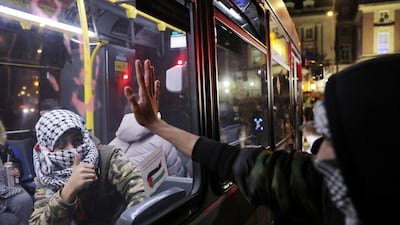A growing number of Americans are donning the keffiyeh, the distinctively patterned scarf that is closely linked with Palestinians, to demand a ceasefire to Israel's attacks on Gaza or to show their support.
Sales of the scarves have jumped since the Israel-Hamas war began in October, US distributors say, even as keffiyehs have been forcibly removed by security at some protests and wearers report being targets of verbal and physical abuse.
"It was like a light switch," said Azar Aghayev, the US distributor for Hirbawi, which opened in 1961 and is the only maker of keffiyehs left in the Israeli-occupied West Bank.
"All of a sudden, we had hundreds of people on the website simultaneously and buying whatever they could.
"In two days, the stock that we had was just gone, and not just gone, it was oversold."
Hirbawi, which has patented its brand, sells scarves internationally through its US and German websites and on Amazon.
All 40 variations on the US website, which include many in bright colours as well as the traditional black and white, are sold out, Mr Aghayev said.
Unit sales of keffiyeh scarves have risen 75 per cent in the 56 days between October 7 and December 2 on Amazon compared with the previous 56 days, data from e-commerce analytics firm Jungle Scout showed.
Searches for "Palestinian scarf for women" rose by 159 per cent in the three months to December 4 compared with the previous three months.
The keffiyeh, with its fishing net pattern, is common throughout the Arab world, with roots dating as far back as 3100 BC.
It first came to symbolise Palestinian resistance during the 1936 Arab Revolt against British rule and later became the signature head gear of Palestine Liberation Organisation leader Yasser Arafat.
While Hirbawi is the best-known maker, others include small artisans and global copycats; luxury goods maker Louis Vuitton sold a version in 2021.
"If we could stock 20,000 keffiyehs, we would have sold them," said Morgan Totah, founder of Handmade Palestine, a group based in the West Bank city of Ramallah that sells local artisans' wares online.
US supporters of the Palestinians and Israel have faced threats and attacks since the Middle East conflict began, with Jewish Americans seeing an increase in anti-Semitism and Muslim Americans in Islamophobia.
The Council on American-Islamic Relations has documented several instances of people attacked for wearing a keffiyeh, from a father assaulted in a Brooklyn playground to a Harvard graduate student who was told she was wearing a "terrorist" scarf.
In the most serious incident, three college students of Palestinian descent – two wearing keffiyehs – were shot in Burlington, Vermont, while taking a walk last month.
Hisham Awartani, 20, is paralyzed from the chest down. Authorities have charged a suspect in the shootings with attempted murder and are investigating whether it was a hate-motivated crime.













